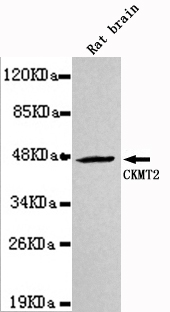-
Product Name
Anti-CKMT2 (3F4) Mouse antibody
- Documents
-
Description
CKMT2 (3F4) Mouse monoclonal antibody
-
Tested applications
WB
-
Species reactivity
Rat
-
Alternative names
CKMT 2;Basic-type mitochondrial creatine kinase;CKMT 2;CKMT2;CPK;Creatine kinase mitochondrial 2;Creatine kinase mitochondrial 2 (sarcomeric);Creatine kinase S-type; creatine kinase S-type antibody; mitochondrial;KCRS_HUMAN;Mib CK;Mib-CK;mitochondrial; OTTHUMP0000 antibody
-
Isotype
Mouse IgG2b
-
Preparation
Antigen: Purified recombinant human CKMT2 protein fragments expressed in E.coli.
-
Clonality
Monoclonal
-
Formulation
Purified mouse monoclonal in buffer containing 0.1M Tris-Glycine (pH 7.4 150 mM NaCl) with 0.02% sodium azide 50% glycerol
-
Storage instructions
Store at 4°C short term. Store at -20°C long term. Avoid freeze / thaw cycle.
-
Applications
WB: 1/1000
-
Validations

Western blot detection of CKMT2 in Rat Brain lysates using CKMT2 mouse mAb (1:1000 diluted).Predicted band size:47KDa.Observed band size:47KDa.
-
Background
Swiss-Prot Acc.P17540.Mitochondrial creatine kinase (MtCK) is responsible for the transfer of high energy phosphate from mitochondria to the cytosolic carrier, creatine. It belongs to the creatine kinase isoenzyme family. It exists as two isoenzymes, sarcomeric MtCK and ubiquitous MtCK, encoded by separate genes. Mitochondrial creatine kinase occurs in two different oligomeric forms: dimers and octamers, in contrast to the exclusively dimeric cytosolic creatine kinase isoenzymes. Sarcomeric mitochondrial creatine kinase has 80% homology with the coding exons of ubiquitous mitochondrial creatine kinase. This gene contains sequences homologous to several motifs that are shared among some nuclear genes encoding mitochondrial proteins and thus may be essential for the coordinated activation of these genes during mitochondrial biogenesis. Three transcript variants encoding the same protein have been found for this gene.
Related Products / Services
Please note: All products are "FOR RESEARCH USE ONLY AND ARE NOT INTENDED FOR DIAGNOSTIC OR THERAPEUTIC USE"
